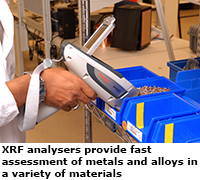Instrument hire provides access to the latest inspection technologies
21/02/2014
As part of a strategy to create a ‘Centre of Excellence’ in non-destructive testing equipment, Ashtead Technology has invested heavily in both its rental fleet of instruments and technical support. In this article, Neil Harrap, the company’s NDT Market Manager, highlights some of the inspection technologies that are most popular within the metal products manufacturing sector. He explains how the addition of the latest ultrasonic inspection technology to the company’s fleet of rental instruments means that engineers now have access to the latest flaw detection and thickness measurement equipment, in addition to other key technologies, such as visual inspection instruments and positive material identification (PMI) equipment.Flaw detection and thickness measurement
The GE USM Go is ideal for the assessment of welds, forgings, castings and composite materials. Combining a thickness gauge and a flaw detector in one single, lightweight instrument, the USM Go is available for hire with optional thickness and flaw detection kits. This means that NDT personnel now only need to carry one inspection instrument to perform accurate and dependable thickness measurement and flaw detection. A further benefit of this dual modality is a significant reduction in operator training times.
Whilst the USM Go is capable of highly-sophisticated measurements, it has been designed for simplicity. There is little need to refer to the manual; clear instructions are provided via the graphical user interface and navigation is simplified with an innovative joystick, allowing one-handed operation for fast and accurate adjustment, and the unit can also be rotated for left- or right-handed operation.
Precise time-of-flight is indicated in μs and an automatic gate threshold for the two gates ensures highly-accurate and reproducible measurements, while a backwall echo (BWE) attenuator helps to identify low-amplitude reflections.
Small, lightweight and water, dust and shockproof, the USM Go is able to run for up to six hours on internal batteries.
With a broad range of extremely useful features, such as inspection data recording, the USM Go is an important addition to Ashtead Technology’s rental fleet. The flexibility of this instrument makes it ideal for a diverse range of inspection applications, including industrial engineering, metal fabrication, railway, aerospace, power generation, petrochemical and the automotive sector.
Positive material identification
 PMI is an integral part of quality control and process safety management in a wide range of industries. For example, in the oil, gas and petrochemical sector, component quality is critical because a high level of component traceability is required, health and safety requirements are extremely tight and the cost of component failure is high.
PMI is an integral part of quality control and process safety management in a wide range of industries. For example, in the oil, gas and petrochemical sector, component quality is critical because a high level of component traceability is required, health and safety requirements are extremely tight and the cost of component failure is high.XRF analysers provide fast, non-destructive, qualitative and quantitative assessment of metals and alloys in a variety of materials. They are becoming increasingly popular in a wide variety of applications, in addition to quality control in manufacturing, including metal evaluation in waste management, weld testing, contamination testing of soils and airborne particulates, electrical equipment testing under the RoHS and WEEE directives, the screening of consumer goods for contaminant materials, such as lead in paint, toys and packaging etc, and the qualitative analysis of precious metals.
Ashtead Technology’s XRF analysers are able to provide a quick, accurate screening method coupled with a pass/fail display and data logging with encryption to ensure the validity of data. Furthermore, instant certificates of compliance are made possible with the NDT software that is supplied with the analysers free of charge.
Delivering high levels of accuracy and precision, these advanced instruments are portable and able to quickly measure all metals with a higher atomic weight than aluminium. In addition, several hundred alloys are stored on the XRF analyser’s library and customised settings are available for unique alloys, including a ‘pass/fail’ mode.
Visual inspection
Flexible borescopes (also known as videoprobes or videoscopes) enable the internal inspection of products that would otherwise be difficult or impossible to access. The latest instruments employ a tiny camera and a light source mounted at the tip of a flexible probe that can be inserted into very small cavities, providing high-quality images and/or video that can be viewed or saved for later analysis or reports. The inspection capability that borescopes provide is especially valuable to engine, machinery and component manufacturers, in addition to those responsible for checking and maintaining machinery, because internal inspection without dismantling can save a great deal of time and money.
A wide range of rental borescopes are available, with probe lengths varying from 3 to 9.6 m, and probe diameters ranging from 2.4 to 6.1 mm. Maintaining a broad selection of the leading brands so that customers can choose the instrument that best meets their needs, Ashtead Technology continually invests in the latest models, such as the Olympus IPLEX UltraLite, the IPLEX LX and the GE XL Go.
Reasons to rent
The best technology can be expensive, so it makes financial sense to hire this equipment as and when it is required. However, even if there is a frequent requirement, it also makes sense to hire because this provides the opportunity to use the latest and most appropriate technology.
Renting avoids the cost of both depreciation and instrument service. Ashtead Technology’s engineers employ all of the latest service and calibration equipment and are manufacturer-trained to ensure that equipment is delivered clean, tested and ready for action.
www.ashtead-technology.com